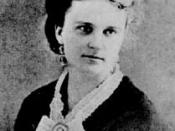Kate ChopinÃÂs ÃÂThe Story Of An HourÃÂ examines a womanÃÂs reaction to her husbandÃÂs death. The story was written in the nineteenth century, when highly restrictive gender role denied women of living life the way they wanted. Chopin presents a situation where a woman is not only dumb-founded with her husbandÃÂs death, but celebrates her loss. The protagonist, Mrs. Mallard, has a very bizarre response to the death of her husband, who in the end is alive and well, far from the accident he was said to have been a part of.
Mrs. Mallard, was married to a working man. Being that the story was written in the nineteenth century, Mr. Mallard was obviously the bread winner, while Mrs. Mallard stayed at home. This may have been either because of her heart problems, or because she was not allowed to work. When Josephine and Richards plan to break the news of her husbandÃÂs death to Louise, they believe it should be brought to her ÃÂas gently as possible,ÃÂ (516, Chopin) thinking it would make her upset and possibly more ill.
ÃÂShe wept at once, with sudden, wild abandonmentÃÂ (516). describes her first reactions, however without notice on what was to come. ÃÂAnd yet she had loved him-sometimes. Often she had not.ÃÂ (517). This statement illustrates her relationship with Mr. Mallard. She may have been confused whether she really cared he was gone or not. ÃÂA kind intention or a cruel intention made the act seem no less a crime as she looked upon it in that brief moment of illumination.ÃÂ (517). It seems Mrs. Mallard was starting to wonder if her husbandÃÂs death was worth the tears and heartache.
Her reaction to her husbandÃÂs death could be described as abnormal. ÃÂWhen the storm of grief had spent itself she went to her room alone. No one would follow her.ÃÂ (516). At first, she seems to take the death as any woman or man would be expected to. She locks herself in a room where no one can see her reaction or stop her from causing any kind of harm to herself. When she states ÃÂshe did not stop to ask if it were a monstrous joy that held her,ÃÂ (517), it became clear Mrs. Mallard was beginning to rethink the death of her husband. She started to foreshadow her life and what it would be like without her husband, a man who has robbed her of freedom. ÃÂThere would be no one to live for during those coming years; she would live for herself.ÃÂ (517). ÃÂWhat could love, the unsolved mystery, count for in the face of this possession of self-assertion which she suddenly recognized as the strongest impulse of her being!ÃÂ (517). Instead of dreading her loss, Mrs. Mallard planned what she was going to do in the future with her new freedom.
Mrs. Mallard would not look at the bad, but only the good that was yet to come. As she sat in her room after receiving the news, she plunges into a variety of thoughts and feelings. ÃÂThere stood, facing the open window, a comfortable, roomy armchair. Into this she sank, pressed down by a physical exhaustion that haunted her body and seemed to reach into her soul.ÃÂ (516). This statement depicts her as feeling powerless, or having nothing to live for. IÃÂm sure the chair was to symbolizes a sense of security and comfort despite Mr. MallardÃÂs death. The open window was to express a connection between Louise and the world. After sitting for a while, she gathers her thoughts and regroups herself. ÃÂIt was not a glance of reflection, but rather indicated a suspension of intelligent thought.ÃÂ(516). ÃÂBut she felt it, creeping out of the sky, reaching toward her through the sounds, the scents, the color that filled the air.ÃÂ (517). Mrs. Mallard was imagining a sense of happiness, or freedom. It was a feeling she had long felt, and she accepted it. ÃÂThe tops of trees that were all aquiver with new spring lifeÃÂ (516) and ÃÂthe delicious breath of rain was in the airÃÂ (516) reveal Mrs. Mallard was starting to realize and sense things she never has, at least not for a long time. The statement ÃÂpatches of blue sky showing here and there through the cloudsÃÂ (516) symbolize a sign of future freedom and independence, additionally detailing the growing excitement of her husbands death.
There are moments when she is afraid or too confused to think about anything. It seems reality would prevent her from feeling the way she wanted when Chopin states ÃÂshe was striving to beat it back with her will.ÃÂ (517). Mrs. Mallard would have to be dependant on societyÃÂs rules, determining her thoughts of freedom to be incorrect. ÃÂA long procession of years that would belong to her absolutely.ÃÂ (517). ÃÂThere would be no powerful will bending hers in that blind persistence with which men and women believe they have a right to impose a private will upon a fellow creature.ÃÂ (517). These acknowledge she was unhappy with life or even marriage. She could not have her own opinion or show her own will. She realizes she is now entitled to an opinion, causing her to be overjoyed with freedom.
Just as Mrs. Mallard seems to be free, something happens to change everything in the story. ÃÂSpring days, and summer days, all sorts of days that would be her ownÃÂ (517) and ÃÂgoddess of victoryÃÂ (517) put Louise at high, allowing her to believe a good life was just around the corner. This may also be considered the climax of the story, leaving the reader to suppose she will live the rest of her life alone and free. As Louise leaves her room, Mr. Mallard arrives through the door. ÃÂHe enters composedly carrying is grip-sack and umbrellaÃÂ (517) proves Mr. Mallard had no idea about the accident and his name being on the death list. Mrs. Mallard falls down the stairs after the sight of her husband, killing her. Chopin says Mrs. Mallard died of ÃÂthe joy that kills.ÃÂ (517). This statement depicts the thoughts of the doctor who analyzes her death. The doctor believes Louise died of the excitement of seeing her husband alive. Although this may be true, it could additionally be favored that she had chosen to die rather than to live under her husbandÃÂs will again, after the experience of freedom and independence.
Mrs. MallardÃÂs only happiness in life lasted her an hour. It was spent in an armchair, looking out the window, reminiscing the death of her husband and the freedom she was to have in the future. This was the story of an hour, an hour of happiness which ends fatal.
Kennedy, X. J., and Dana Gioia. Literature. 11th ed. Perfection Learning, 2001. Print.





